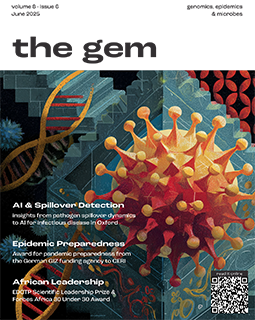Climate change and epidemics: Report says what can be done
The increase in epidemics fuelled by climate change across the world, and the severe implications they have on the health of the most vulnerable communities, particularly in the Global South, are captured in a groundbreaking research report on climate change and infectious diseases.

Eve Ruwoko, University World News, 06 December 2023
The Climate Amplified Diseases and Epidemics (CLIMADE) report, How Epidemics are Being Amplified by Climate Change, was launched at the ongoing United Nations climate change conference, or COP28, in the United Arab Emirates on 3 December by representatives of the World Health Organization (WHO) AFRO COP28 delegation, Mozambique’s Ministry of Health and the Centre for Epidemic Response and Innovation (CERI) at Stellenbosch University in South Africa.
CLIMADE, a global consortium led by the Global South to study and respond to climate-amplified diseases and epidemics, has worked collaboratively with national public health laboratories, research centres for infectious diseases, health ministries and universities for nearly six months to produce the report. As such, the report highlights the critical interface between science and policy-making to tackle societal crises.
The consortium, which aims to predict, track and control diseases and epidemics fuelled by climate change, is made up of scientists from across the world whose mission includes bridging knowledge gaps, improving surveillance tools and increasing interventions to lower the impact of diseases and epidemics fuelled by climate change.
A rise in human pathogens
The report carries overwhelming evidence linking climate change to the rapid increase of disease outbreaks and epidemics with studies from over 100 global scientists and health officials from institutions across the world, particularly in the Global South.
It states, based on research included in the report, that 'climate change has the potential to aggravate over 50% of known human pathogens', posing huge risks to the health and well-being of different communities.
According to Professor Tulio de Oliveira, the director at CERI, who is leading the CLIMADE consortium, the studies identified three main climate-related contributors to infectious diseases. Firstly, the gradual increase in global temperatures is creating a conducive environment for disease vectors such as mosquitoes to multiply, and, secondly, to increase their geographical range to previously unaffected communities and, lastly, frequent occurrences of extreme events such as floods are also contributing to diseases.
Changes in temperature and precipitation patterns, referred to as climate migration, also lead to water and food insecurity, creating gaps for the spread of diseases in vulnerable communities.
'This report is highly relevant to ongoing climate discussions at COP as it draws attention to the intersection of climate change and epidemics, emphasising the need for swift, decisive action'.
'It highlights the disproportionate impact on vulnerable populations in the Global South and urges global collaboration to address climate-amplified diseases, aligning with the overarching goals of COP conferences,' De Oliveira stated.
The report explores, among others, the epidemiological trends of a recent cholera outbreak which resulted in 60,000 cases and 2,000 deaths in Malawi following flooding conditions in 2022. It also highlights the risk of the importation of dengue fever (also known as breakbone fever, that spreads from mosquitoes to people, mainly in tropical and subtropical climates) and increased risks of epidemics in African countries following dengue introductions.
The outbreak of Chikungunya (a viral disease spread by Aedes mosquitoes to humans) in Paraguay with over 120,000 confirmed cases, and dengue outbreaks across South Asia, particularly Vietnam, and Southern Europe, addressed in the report, have become clear indicators to the sharp increase of epidemics due to rising temperatures.
Responding to epidemics
During an interview with University World News, De Oliveira outlined that, within the past six months, the CLIMADE consortium had responded to multiple epidemics, including the cholera outbreaks in Africa and Haiti, as well as dengue, Chikungunya, and yellow fever viruses in multiple South American, South Asian and African countries.
'We have been active in Africa where, in the past few months, we responded to cholera outbreaks in Malawi, Mozambique and the Democratic Republic of the Congo. We have also identified new variants of Chikungunya in Senegal and in Burkina Faso'.
'We are currently trying to characterise the new outbreak of dengue, which is happening in Ethiopia, especially in the highlands, and which is very unusual and unexpected but, due to global warming, is spreading even to the higher altitudes. That is one part of our CLIMADE programme – to respond to epidemics in real time and characterising the variants that are being transmitted and then feed that information to the public health officials,' he said.
Scientists have argued that, while countries in the Global South contribute less than 10% of greenhouse gas emissions, their communities are more vulnerable and at risk of climate disasters and health implications. In addition, they also lack enough resources and capacity to respond to these threats.
The report, therefore, aims to bring together different stakeholders, from policy-makers to scientists, research and academic institutions, public health organisations and the private sector, to act collectively and to apply their diverse expertise and resources to address the interconnected challenges of climate-amplified diseases and epidemics.
There is also an urgent need to invest in developing resilient healthcare systems, infrastructure and disaster preparedness measures. Governments could also use their national responses to climate change as an opportunity to build capacity to support and strengthen healthcare systems, particularly in the most vulnerable communities, according to the report.
Transparency and collaboration
Dr Cheryl Baxter, the head of scientific support at CERI, highlighted that the recommendations to address challenges highlighted in the CLIMADE report include immediate and transparent reporting of infectious disease outbreaks, strengthening genomic surveillance, prioritising vulnerable populations, promoting climate resilience within healthcare systems, and committing sustainable funding.
These actions required commitment and collaboration between governments, academic institutions, scientists, public health officials, private-sector industries, and health organisations.
'Academic institutions and private-sector industries should collaborate to develop innovative solutions that enhance climate resilience within healthcare systems. This includes designing infrastructure to withstand extreme weather events and ensuring the availability of essential medical supplies during crises'.
'Governments, private-sector industries and health organisations must commit to sustainable funding dedicated to the fight against climate change-related infectious diseases. This funding should support research, capacity-building and community engagement to create a robust defence against these converging threats,' she said.
She emphasised the importance of transparency, as sharing crucial data with relevant stakeholders was critical for global preparedness and response efforts. In addition, it was also paramount for governments to invest in monitoring tools which help to mitigate the evolution of infectious diseases while allowing early detection and prevention of outbreaks before they spread.
The role of universities
De Oliveira emphasised the fundamental roles that universities and research centres play in addressing challenges related to climate change and epidemics in the region. This includes conducting research on the specific climate-amplified diseases affecting their regions and providing education and training to policy-makers and communities on the intersection of climate change and health.
'Universities have been collaborating with governments and health organisations to enhance genomic surveillance capabilities, developing innovative solutions to improve climate resilience in healthcare systems and advocating for sustainable funding and supporting community engagement initiatives to address the challenges outlined in the report,' he said.
He mentioned that the second arm of the consortium focused on providing training and capacity-building opportunities for early-career researchers in Africa, and also had researchers who contributed towards the CLIMADE report.
'In the past three years, we acquired funding from various organisations, including the Rockefeller Foundation, the World Bank, the Africa Centre for Disease Control and the World Health Organization to create a very large fellowship programme under CERI.'
'In these three years, we have received over 400 fellows from 52 African countries whom we trained on how to respond to epidemics, how to conduct genomic surveillance of outbreaks and, importantly, how to conduct data analysis of epidemics'.
'Upon their request, we also trained the fellows on grant writing, applications and management of fellowship programmes so that they can start competing for international funding to further develop the research they are conducting,' he said.
News date: 2023-12-06
Links:
https://www.universityworldnews.com/post.php?story=20231205105251609










